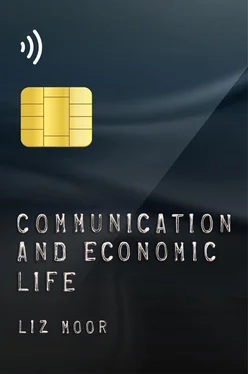158 157
159 158
160 159
161 160
162 161
163 162
164 163
165 164
166 165
167 166
168 167
169 168
170 169
171 170
172 171
173 172
174 173
175 174
176 175
177 176
For Max and Ezra
Communication and Economic Life
LIZ MOOR
polity
Copyright © Liz Moor 2022
The right of Liz Moor to be identified as Author of this Work has been asserted in accordance with the UK Copyright, Designs and Patents Act 1988.
First published in 2022 by Polity Press
Polity Press
65 Bridge Street
Cambridge CB2 1UR, UK
Polity Press
101 Station Landing
Suite 300
Medford, MA 02155, USA
All rights reserved. Except for the quotation of short passages for the purpose of criticism and review, no part of this publication may be reproduced, stored in a retrieval system or transmitted, in any form or by any means, electronic, mechanical, photocopying, recording or otherwise, without the prior permission of the publisher.
ISBN-13: 978-0-7456-8701-8
ISBN-13: 978-0-7456-8702-5(pb)
A catalogue record for this book is available from the British Library.
Library of Congress Control Number: 2021939063
by Fakenham Prepress Solutions, Fakenham, Norfolk NR21 8NL
The publisher has used its best endeavours to ensure that the URLs for external websites referred to in this book are correct and active at the time of going to press. However, the publisher has no responsibility for the websites and can make no guarantee that a site will remain live or that the content is or will remain appropriate.
Every effort has been made to trace all copyright holders, but if any have been overlooked the publisher will be pleased to include any necessary credits in any subsequent reprint or edition.
For further information on Polity, visit our website: politybooks.com
Many people have helped me to complete this book. Three reviewers of the original proposal made helpful suggestions, while Nick Couldry, Jo Littler and Don Slater offered early encouragement. Parts of chapter 1were presented to the Geography department at the University of Nottingham and I greatly appreciated their attentive reading and thoughtful comments. Some ideas were also tested at a MeCCSA panel organized by Rebecca Bramall, who has been kind and supportive throughout. At Polity, Stephanie Homer, Ellen MacDonald-Kramer and Mary Savigar have all been endlessly patient and accommodating, for which I am very grateful.
Friends and colleagues who read parts of the text include Clea Bourne, Beckie Coleman, David Moats and Dave O’Brien. I would like to thank them for their frank and constructive feedback. The remaining errors and omissions are my own.
Some parts of chapter 2have previously been published in Consumption, Markets and Culture and in the Journal of Cultural Economy . I am grateful to Jonathan Schroeder for encouraging me to put my thoughts about money symbolism down on paper at a relatively early stage, and to Liz McFall for ongoing enthusiasm and kindness. Liz has been central to many people’s experience of intellectual community in recent years, at a time when it has been especially important. My thinking about price (and much else) has been enriched through conversations with Celia Lury. Lana Swartz provided encouragement and inspiration from across the Atlantic.
Colleagues at Goldsmiths supported me with a one-term sabbatical. I am particularly grateful to Clea Bourne, Natalie Fenton, Gholam Khiabany, Rachel Moore, Anamik Saha, Gareth Stanton and Milly Williamson for encouragement, gifts of books and cakes, teaching and administrative cover, and general good vibes. I would also like to thank Jenny Carpenter, Sam Friedman, Meghan Horvath, Shireen Kanji, Kate Maclean, Rebecca Strong and Emma Uprichard. Chris Arning made trips to the British Library more companionable. Max and Ezra are the best possible people to come home to. Special thanks to Sarah Bloomfield for the expert childcare that made finishing the book possible.
At the end of 2016, Anand Menon, an expert on European politics, reflected on what he had learned from a year spent travelling around the UK to discuss the referendum on leaving the European Union. During a trip to the northeast of England he had told a town hall-style meeting that the vast majority of economists agreed that exiting the EU would lead to a substantial economic slowdown, and a two per cent drop in gross domestic product (or GDP), the usual measure of an economy’s health. Responding to him, a member of the audience had shouted, ‘That’s your bloody GDP. Not ours!’. On another excursion, he had met a woman in Yorkshire who told him that she didn’t mind taking the economic ‘hit’ associated with Brexit, but that it would be ‘nice to see the rich folk down south suffer’ (Menon 2016a). Reflecting on these events, Menon thought that they showed a distrust of elites and experts, but also a distrust of aggregate data and statistics. Perhaps it was all very well to show that on average membership of the EU had increased GDP, or that on average migration to the UK had been positive for the economy, but if these averages did not tally with people’s own experience, then it was unsurprising that the figures might not seem to ‘belong’ to them (Menon 2016b). As one commentator observed, maybe Menon’s heckler was right that the UK economy had become so unequal that ‘it can no longer be talked about as one unitary economy’ (Chakrabortty 2017).
Academic research confirms that not everyone experiences the economy in the same way, and that many people struggle to understand key concepts. When Jack Mosse (2018) asked people in north London to define ‘the economy’, most were unable to do so, and when he asked them if they felt part of it, many simply didn’t understand what he meant. It is not just that measures like GDP reflect national rather than local output, but that the terms themselves – sometimes even terms like ‘the economy’ – are often too far from most people’s experience to be meaningful. There is a split between the breadth of our actual economic lives and what counts as the economy in more formal spaces. This is reflected in my own discipline of media and communications. When we talk about media and the economy, ‘the economy’ is usually understood as the macro economy or the activities included in GDP, and ‘the media’ usually refers to television and print news, or the websites and social media feeds of news providers. 1Alternatively, we may think about how patterns of ownership or other business relationships influence ‘communication’, but this is understood almost exclusively in terms of the mass communication of news or advertising, rather than the way people talk in everyday life. While work in this field has been very good at showing how few voices get heard in news reporting of economic crises (e.g., Berry 2013) or how ‘bad’ economic news tends to attract more coverage than good (Harrington 1989; Damstra and Boukes 2021), it has mostly avoided questioning how concepts of ‘the economy’ are arrived at in the first place, and who or what this leaves out.
The importance of economic communication , when it is addressed, is understood either in terms of comprehension or in terms of ‘bias’. In the wake of the global financial crisis of 2008, for example, public debate focused partly on the question of why no one had seemed to see it coming, but also on the extent to which the language of finance, as well as the financial products being described, had become so complex that few people, including regulators, could understand it (see, e.g., GAO 2009; Schwarcz 2009). As John Lanchester, a novelist and chronicler of the crisis, put it some years later, ‘the language of money is a powerful tool, and it is also a tool of power. Incomprehension is a form of consent. If we allow ourselves not to understand this language, we are signing off on the way the world works today’ (2014: n.p.). In this view, many of the problems of the financial sector were really problems of communication and comprehension. The solution was something like a collective education programme: Lanchester encouraged those who shared his concerns to learn the language of finance so that they may better scrutinize the financial sector and hold it to account.
Читать дальше











![John Bruce - The Lettsomian Lectures on Diseases and Disorders of the Heart and Arteries in Middle and Advanced Life [1900-1901]](/books/749387/john-bruce-the-lettsomian-lectures-on-diseases-and-disorders-of-the-heart-and-arteries-in-middle-and-advanced-life-1900-1901-thumb.webp)